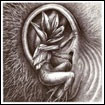 BOTANIST III: Doom In Bloom 2 x CD (Total Rust) 14.98
BOTANIST III: Doom In Bloom 2 x CD (Total Rust) 14.98��� The third album from this unique San Francisco botanical metal outfit has been released on limited-edition vinyl for the first time, a double LP pressed on black vinyl and housed in gatefold packaging, limited to three hundred fifty copies. We also just restocked the original double CD release on TotalRust, which features an entire second disc of additional material from other bands featuring Botanist's Otrebor on drums.
��� There was never a moment where you could confuse Botanist with a typical black metal outfit. From the beginning, this San Francisco based one-man band crafted a wholly unique sound, taking signature elements of black metal and reshaping them using just drums and dulcimer into something new, a dissonant, ethereal sound shot through with shockingly pretty melodies that at times could remind me of old NY noise rock outfits like Band Of Susans more than anything "blackened". Main member Otrebor tied that unusual dulcimer-draped sound to an aggressive eco-consciousness, explored through a surreal fantasy world where plant life becomes the dominant life form, a concept that has expanded over the course of each new album. The combination of all of this produces one of the weirdest (and coolest) things to come out of the fringes of the US black metal underground.
��� On Botanist's third album Doom In Bloom, Otrebor again shifted his approach, moving into even more melodically-rich directions from the previous releases. The seven songs come across more like some blackened, funereal post-rock, the music much slower than before, with a mournful atmosphere descending across all of these long sprawling songs. His drumming takes on a more deliberate, stately feel, with expressive percussive touches underscoring the wistful tone of the dulcimer's steel-strung melodies; there's a strong contrast with the more frenzied, pell-mell pacing of his earlier albums. Some of the songs on Bloom stretch out for twelve minutes or more, dark mournful arrangements of emotional melody shifting into waves of rumbling double-bass and chant like singing, opening up into passages of hushed piano and aching instrumental beauty. As always, the distinctive clang of the dulcimer brings an unusual folky feel, but the riffs are more muted, the "doom" aspect suggested at in the album's title materializing through the creeping dread of tracks like "Deathcap". There's a funerary vibe as well, turning some of this stuff into intensely melancholy, folk-flecked drone rock, and elsewhere the sound swells into a strange combination of neo-folk pomp and dark post-rock grandeur. What little residue of black metal remains is mainly heard in the vocals, a weird wheezy croak buried down in the mix, sometimes exploding into monstrous screeching, or reduced to a nervous, tremulous whisper; it's all an abrasive counterpoint to the gorgeous, shadow-stained darkness of the music. Fantastic stuff.
��� The second disc with the double CD version of Bloom is an entirely separate beast. Titled Allies, it's a collection of material from other bands aligned with Botanist, each song using drum recordings that were created for the original album session. Appropriately, this stuff expands further on Botanist's flora-centric themes, but with quite a bit of variety between the various projects. The disc is book-ended with tracks from the obscure outfit Matrushka, who opens and closes the album with waves of minimal glitch and scrape, each a dark, dimly lit piece of industrial murkiness that feels akin to some of the more ambient early Bianchi recordings, but with the addition of distant growling vocals, soft whorls of backwards sound, and far-off pulses of black kosmische energy. From there, though, the bands offer up varying brands of metallic crush: the band Cult Of Linnaeus erupts into a long slow blast of gloomy deathdoom with their song "The War Of All Against All", slipping briefly from their leaden heaviness into stretches of choral mystery and washes of interstellar electronic texture; Trans-Atlantic black metallers Ophidian Forest deliver an impressive piece of mid-paced black metal majesty ("Total Entarchy") that seems to draw as much from latter-day Swans as it does from the frostbitten charge of classic black metal, draping it's slightly murky, vaguely industrialized rumble in symphonic ambience and stirring, folk-flecked melodies; On "It Lives Again", Arborist stomp out a strange, frantic form of folk dirge, heavy drums pounding behind the plaintive strum of acoustic guitars and the howl of some seriously wrecked slide guitar, bits of sorrowful piano melody rising behind the despairing vibe put forth by the singer's anguished, acrid howl - when the song suddenly erupts into a kind of powerful doom-laden blues stomp in it's second half, it turns into one of the most impressive moments on the album, almost akin to a more wretched and skuzzy version of the country-laced heaviness heard on that last Neurosis album; And Bestiary, made up of members of The Human Quena Orchestra and Grayceon teaming up with Otrebor, dredges up some killer gothic-tinged doom, with lovely female vocals drifting across the grim, grinding sludge.
��� My favorite of all of these, though, is Lotus Thief's "Nymphaea Carulea". Another project from Botanist's Otrebor, this has him teaming up with a woman by the name of Bezaelith, the duo creating some seriously stirring dreampop-laced blackened power, and "Nymphaea" is a stunning example, the song crafted around a soaring, dreamy vocal hook and waves of gorgeous ethereal sound, but shot through with aggressive drumming and an undeniable black metal influence that is perfectly balanced with the stunning melodies, like some strange combination of Cocteau Twins and classic Nordic blackness. Can't wait to hear more from this band.
Sample :

